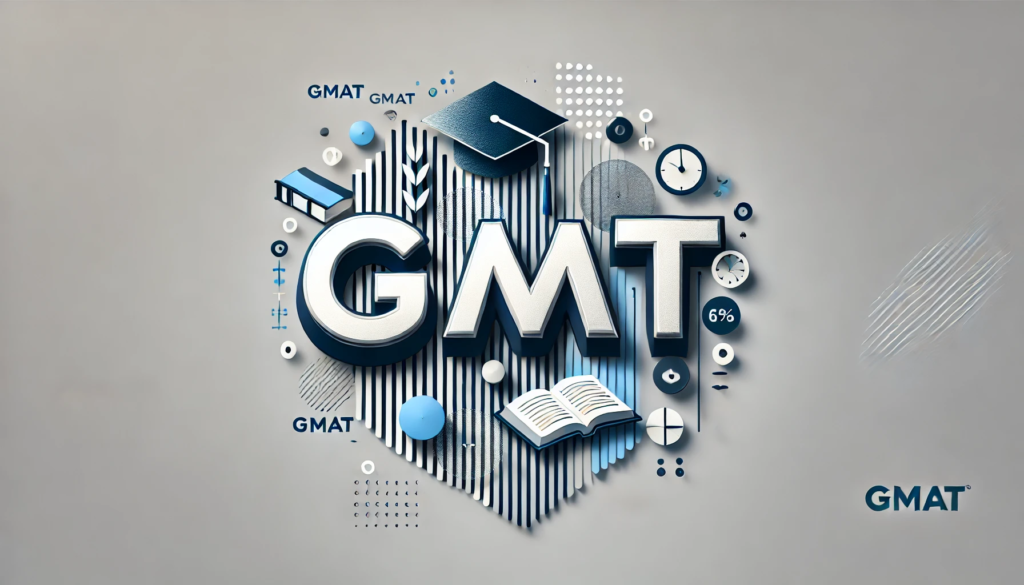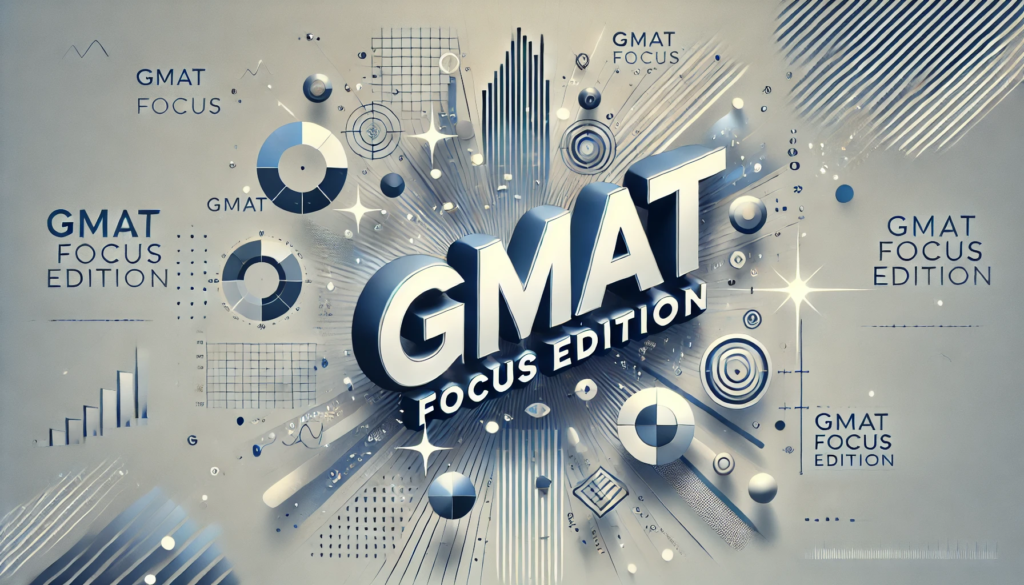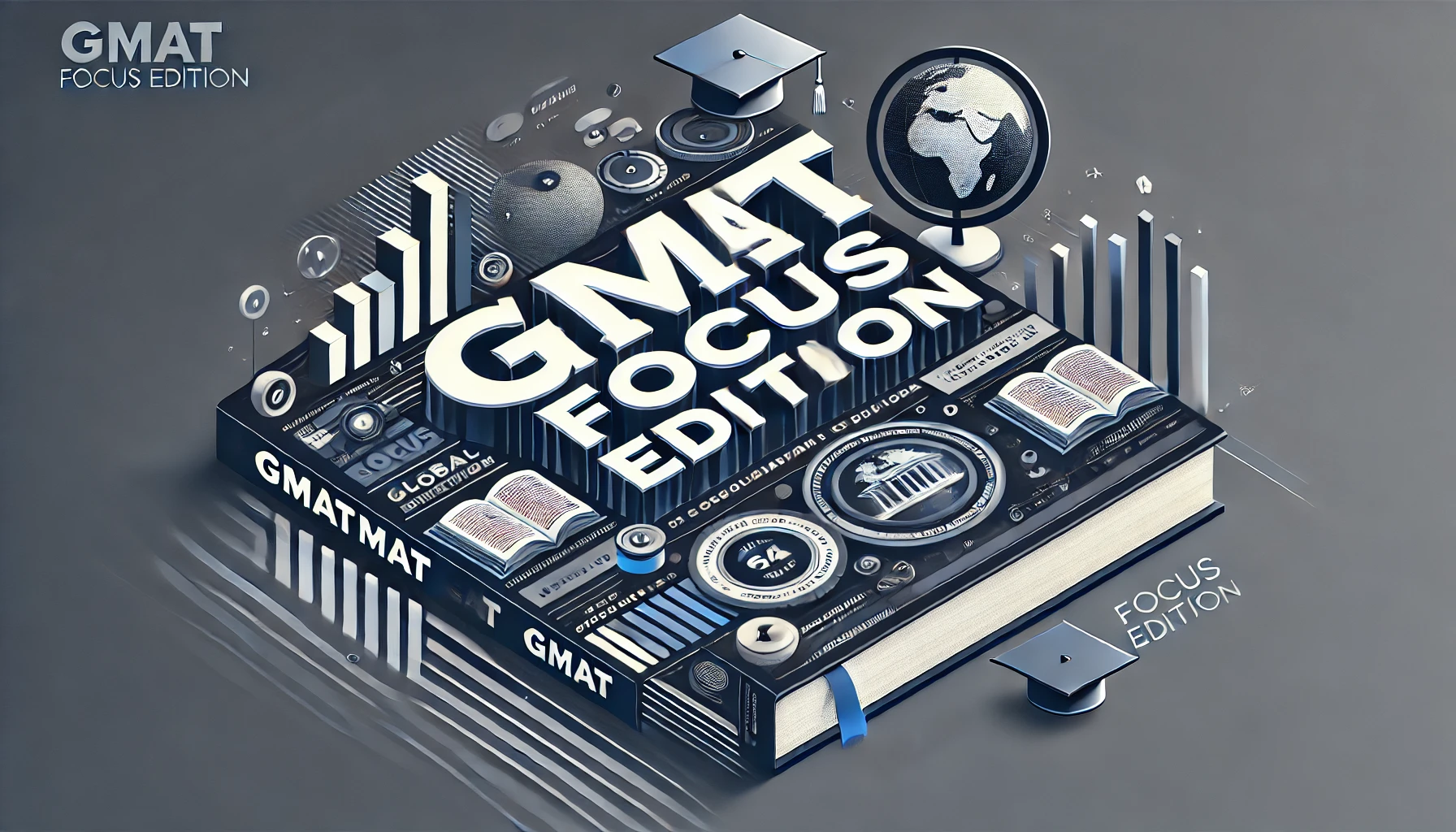The GMAT Focus Edition is the latest iteration of the GMAT exam introduced by GMAC, tailored to meet the evolving needs of business schools and MBA aspirants. With its launch, GMAC aims to create a more focused and efficient testing experience while ensuring the exam remains a critical benchmark for MBA admissions worldwide. This updated version emphasizes skills most valued by modern business programs, such as problem-solving, critical thinking, and data-driven decision-making.
The GMAT Focus Edition differs from its predecessor by offering enhanced flexibility, a streamlined structure, and a scoring system that prioritizes the skills crucial for success in today’s business world. According to GMAC, the test aligns closely with real-world business scenarios and the competencies required for leadership roles. As of 2024, over 7,700 programs across the globe, including top business schools such as Harvard, INSEAD, and LBS, continue to accept GMAT scores for admissions. The GMAT Focus Edition ensures it remains relevant for this competitive landscape.
This guide will provide a deep dive into the GMAT Focus Edition, from its syllabus and scoring changes to preparation strategies, costs, and practice tests, ensuring you are well-equipped to excel.
How Different Is It from the Normal GMAT?

The GMAT Focus Edition distinguishes itself from the traditional GMAT through significant changes in its structure, scoring, and content. These changes are designed to make the test more aligned with the core competencies required in MBA programs while enhancing the overall test-taking experience for candidates.
Structural and Scoring Changes
One of the most notable differences lies in the structure of the GMAT Focus Edition. The test reduces the number of sections, focusing primarily on Quantitative Reasoning, Verbal Reasoning, and Analytical components. The Integrated Reasoning section, which was part of the traditional GMAT, has reportedly been absorbed into other sections, ensuring a more streamlined approach.
The total duration of the GMAT Focus Edition has been adjusted to make it more efficient, though GMAC has retained the computer-adaptive format. While the traditional GMAT had a composite score out of 800, the scoring mechanism for the Focus Edition is expected to reflect more nuanced skills, emphasizing decision-making and problem-solving abilities. These changes not only cater to modern MBA requirements but also make the exam less time-intensive.
Test-Taking Experience
The GMAT Focus Edition enhances the test-taking experience through a more intuitive and user-friendly interface. Candidates can expect updates that reduce test anxiety and allow them to focus better on the questions at hand. The computer-adaptive testing format continues to adjust the difficulty of questions based on a candidate’s performance, ensuring that the exam remains a robust measure of ability.
Moreover, the Focus Edition introduces new question formats that align closely with real-world business scenarios. This change helps bridge the gap between academic knowledge and practical application, making the test more relevant for MBA aspirants. The updated interface also includes features designed to improve navigation, making it easier for candidates to manage their time effectively.
Comparisons with the Traditional GMAT
A closer look at the differences between the two formats reveals that the GMAT Focus Edition is not just an updated version but a more focused and refined assessment. For example, while the traditional GMAT required test-takers to complete four sections in approximately 3.5 hours, the Focus Edition condenses this into a shorter format. Additionally, the updated scoring system provides business schools with insights that better reflect a candidate’s preparedness for MBA coursework.
What Is the GMAT Focus Edition Syllabus?

The GMAT Focus Edition introduces a revised syllabus, with key updates designed to test the skills most relevant to modern business school applicants. This change is not just cosmetic; it reflects the increasing demand for data-driven decision-making, analytical thinking, and problem-solving, all of which are critical for success in MBA programs. Understanding the GMAT Focus Edition syllabus is crucial for preparing effectively and focusing on the right areas of the exam.
Quantitative Reasoning
In the GMAT Focus Edition, the Quantitative Reasoning section continues to assess a candidate’s ability to analyze data, solve quantitative problems, and interpret graphical data. However, the emphasis has shifted slightly. While the traditional GMAT focused heavily on number-based calculations, the Focus Edition places a greater emphasis on problem-solving skills, especially in scenarios that mirror real business challenges. Test-takers will be expected to solve problems that require a blend of mathematical reasoning and business decision-making.
Unlike the previous version, where question types ranged from arithmetic and algebra to geometry, the GMAT Focus Edition questions are designed to assess how well candidates can interpret complex business data and solve problems in a time-sensitive environment. The section also introduces fewer, but more challenging, questions, with an increased focus on reasoning over rote memorization.
Verbal Reasoning
The Verbal Reasoning section of the GMAT Focus Edition has also undergone updates. While the core focus remains on assessing reading comprehension, critical reasoning, and sentence correction, the new syllabus introduces more complex reading passages that require deeper analytical thinking. As business schools increasingly value candidates with strong communication skills, this section is designed to better reflect real-world business environments where candidates must analyze, synthesize, and present information.
One significant change is the introduction of more integrated reasoning elements in the verbal section, which aligns with the business decision-making process. Test-takers will encounter more passages that require not just understanding of the material but the ability to synthesize and apply the information to solve business problems. This shift is meant to prepare students for the business world, where critical thinking and complex problem-solving are paramount.
Analytical & Integrated Reasoning
The Analytical & Integrated Reasoning section, which was a separate component in the traditional GMAT, is now integrated into other sections. This shift was made to streamline the test, while still ensuring that it adequately assesses a candidate’s ability to interpret and analyze data from multiple sources. The Focus Edition emphasizes the ability to draw connections between different pieces of data, an essential skill for future leaders in business.
For example, test-takers might be asked to interpret a series of data points from various sources—such as market reports or financial data—and use that information to make a business decision. This change highlights the importance of both quantitative and qualitative reasoning in today’s business landscape.
Frustrated with Generic College Lists from AI Tools?
Get a tailored college shortlist crafted by study abroad experts who understand YOUR goals, profile, and aspirations.

How to Prepare for the GMAT Focus Edition
Preparation for the GMAT Focus Edition requires a strategic approach, as the test is not only about mastering the content but also developing the skills necessary to apply that knowledge effectively in a business context. With the updated syllabus, MBA aspirants need to focus on honing specific test-taking strategies, improving time management, and building familiarity with the test format. Below are some actionable steps to help you prepare effectively.
Study Resources & Materials
When preparing for the GMAT Focus Edition, it is essential to use official GMAC resources. GMAC offers a variety of official prep materials, including books, online practice questions, and full-length practice exams. These materials closely mirror the content and structure of the actual test, allowing you to gain familiarity with the format and question types.
Aside from GMAC materials, third-party prep companies like Manhattan Prep, Kaplan, and Princeton Review also offer comprehensive study guides and courses. These can be particularly helpful for students who need additional structure in their preparation. Many of these resources provide online practice exams that replicate the computer-adaptive format of the GMAT, ensuring that you are well-prepared for the test environment.
Time Management Strategies
Effective time management is crucial for succeeding on the GMAT Focus Edition. With the test’s emphasis on both quantitative and verbal reasoning, along with more complex questions, managing your time wisely during the exam is critical. One useful strategy is to practice pacing by taking timed practice tests. This will help you familiarize yourself with the pressure of the exam and allow you to develop a rhythm for answering questions efficiently.
Another tip is to start with the easier questions and leave the more challenging ones for later. This way, you can accumulate points early on and avoid running out of time on the tougher questions. Additionally, make sure to practice using the online tools provided in the GMAT Focus Edition to ensure smooth navigation during the actual test.
Practice & Mock Exams
Taking regular practice exams is one of the best ways to assess your readiness for the GMAT Focus Edition. It’s crucial to simulate the actual exam conditions as closely as possible by practicing under timed conditions and limiting distractions. By doing so, you can identify areas where you need to improve and focus your efforts accordingly.
Mock exams not only help you become familiar with the test format but also build the mental stamina needed for a test that can last up to 2.5 hours. Many students find it helpful to review the results of their mock exams in detail, identifying which types of questions took longer to answer or which concepts were challenging.
Leveraging Data & Analytics
Another benefit of using GMAT preparation platforms like GMAC’s official resources is that they provide performance analytics. These tools track your progress over time, showing where you’re excelling and where you need more practice. By continuously assessing your performance, you can adjust your study plan accordingly. These analytics-driven insights help you prioritize your study areas, making your preparation more efficient.
What Is the GMAT Focus Edition Price?

The cost of the GMAT Focus Edition is an important factor for many MBA aspirants. Understanding the price breakdown, including registration fees and additional costs, can help you budget effectively for the test.
Registration Fees and Discounts
As of 2024, the registration fee for the GMAT Focus Edition is approximately $275 (₹22,800 INR), slightly higher than the traditional GMAT, which is priced at $250. This increase reflects the additional features and streamlined test structure introduced in the Focus Edition. GMAC often provides discounts or promotional offers for early registrations, so candidates are encouraged to book their slots well in advance to take advantage of potential savings.
In addition to the base registration fee, candidates may incur costs for rescheduling or canceling their test. Rescheduling fees typically range from $50 to $100 (₹4,100–₹8,300 INR), depending on how close the rescheduling is to the test date. Cancelation fees are usually lower if done early, but candidates should check the GMAC website for the most accurate and up-to-date information.
Additional Expenses
Preparing for the GMAT Focus Edition involves more than just paying for the test itself. Many students invest in official GMAC preparation materials, which cost around $50–$150 (₹4,100–₹12,400 INR) depending on the package. These materials include practice exams, question banks, and study guides. Third-party preparation courses, which often offer comprehensive coaching and additional resources, range from $200 to $1,500 (₹16,600–₹124,500 INR).
Another potential expense is the cost of sending scores to business schools. While GMAC allows candidates to send scores to a limited number of programs for free, sending additional score reports typically costs $35 per school (₹2,900 INR).
Few of the Best GMAT Focus Edition Practice Tests
Practice tests are an indispensable part of GMAT Focus Edition preparation. They not only help candidates familiarize themselves with the test format but also allow them to identify areas of improvement and build confidence before the actual exam.
Official GMAC Practice Tests
GMAC offers the most reliable and authentic practice tests for the GMAT Focus Edition. These tests are designed to replicate the actual test experience, including the computer-adaptive format. The Official Practice Exam 1 and Exam 2, available on the GMAC website, are included with the purchase of the registration fee. Additional practice exams can be purchased for $30–$40 (₹2,500–₹3,300 INR) each.
The official tests provide detailed performance reports, including time spent on each question and areas requiring further attention. This data-driven approach helps students adjust their preparation strategies effectively.
Reputable Third-Party Practice Tests
Several test prep companies, such as Kaplan, Manhattan Prep, and Princeton Review, offer high-quality practice tests tailored to the GMAT Focus Edition. These tests often include unique features like AI-driven performance analytics, personalized study plans, and access to expert instructors for detailed feedback.
While third-party tests are not official, they provide excellent supplementary practice, particularly for students seeking additional question variety. Packages from these providers typically cost between $100 and $300 (₹8,300–₹24,800 INR) and often include access to online resources, such as video lessons and question banks.
Free vs. Paid Tests
Free practice tests are available from both GMAC and several third-party platforms. These tests can be an excellent starting point for candidates on a tight budget or those looking to gauge their initial performance. However, paid tests generally offer more accurate simulations of the actual exam and provide detailed performance insights, making them a worthwhile investment for serious test-takers.
FAQs About the GMAT Focus Edition
As the GMAT Focus Edition continues to gain traction among MBA aspirants, many candidates have questions about its structure, acceptance, and preparation strategies. Below are answers to some of the most common questions.
Is the GMAT Focus Edition Accepted by All Business Schools?
Yes, the GMAT Focus Edition is widely accepted by all business schools that previously recognized the traditional GMAT. Leading institutions, such as Harvard Business School, INSEAD, and Wharton, have confirmed that they will continue to accept GMAT scores for admissions. The Focus Edition is designed to meet the evolving needs of these programs, ensuring its relevance in the competitive MBA admissions landscape.
Can I Retake the GMAT Focus Edition Multiple Times?
Similar to the traditional GMAT, candidates can take the GMAT Focus Edition up to five times in a rolling 12-month period and no more than eight times in total. Retake policies, including the 16-day gap requirement between attempts, remain unchanged. If you are considering a retake, it is advisable to analyze your previous test results and focus on improving specific areas to maximize your next score.
Do I Need to Prepare Differently If I’ve Studied for the Old GMAT?
While the core concepts of the GMAT remain consistent, the Focus Edition emphasizes efficiency and real-world business applications. Candidates transitioning from the traditional GMAT should focus on understanding the updated syllabus and test structure. For example, the Integrated Reasoning section has been absorbed into other sections, requiring a more integrated approach to preparation. Investing in updated prep materials and taking practice tests specific to the Focus Edition will ensure a smoother transition.
How Early Should I Start Preparing for the GMAT Focus Edition?
Preparation timelines vary depending on individual schedules and starting proficiency levels. However, most candidates spend three to six months preparing for the GMAT Focus Edition. If you’re balancing a full-time job or other commitments, starting earlier allows for more flexible study sessions. Creating a structured study plan with milestones for syllabus coverage, practice tests, and review periods is essential.
Will GMAT Focus Edition Scores Replace Old GMAT Scores for Admissions?
No, GMAT Focus Edition scores will not replace scores from the traditional GMAT. Candidates can choose which version of the test to take based on their comfort level and preparation. Most business schools will accept both versions for a transitional period, but it’s important to check specific requirements with your target programs.
Conclusion
The GMAT Focus Edition is a forward-thinking evolution of the traditional GMAT, designed to align with the demands of modern MBA programs. With its streamlined syllabus, enhanced scoring system, and real-world application focus, the exam is poised to remain a cornerstone of business school admissions.
By understanding its nuances, leveraging the best preparation resources, and staying updated on official guidelines, you can position yourself for success on test day. If you’re considering taking the GMAT Focus Edition, start planning your preparation today and take a step closer to your MBA dreams.




